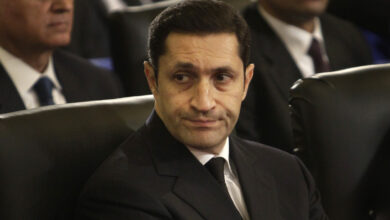I honestly thought Hosni Mubarak would never make it to court, that the blow to his pride would kill him, or else like some ancient Roman noble, that he’d fall on his spear or slit his wrists in the bath to rob the mob of the humiliating spectacle. Alas, the most eloquent gesture witnessed Wednesday was the ousted president picking his nose, as if signaling his contempt for the entire proceeding.
Lying on his stretcher, his features contorted with age and arrogance, he reminded me of the portrait in Dorian Grey’s attic. Beside him stood Gamal, sullen and defiant with entitlement, and an agitated Alaa weaving side to side like a boxer anxious to throw the first punch. There was the unruly pack of lawyers, their charges interspersed with numbers of Egyptian pounds, commodifying pain and loss like merchants in hell’s bazaar. And finally the judge, sitting as stolidly as a father at the dinner table, although this hearing offered less meat than bones of contention.
The charges of murder and corruption brought against the defendants are grave, yet they barely begin to address the regime’s transgressions. Several generations of Egyptians have been denied a decent education due to mismanagement and neglect, ensuring their life-long struggle to survive in a viciously competitive world. Nor will the rape of Egypt’s once bountiful countryside and the impoverishment of its fellahin feature on the list of charges, even though a growing population will suffer hunger as a result of blatant, protracted abuse.
As for the relentless enforcement of the Emergency Law, its effects will continue to unfold in the coming years. The suspension of due process has eroded society’s foundations, encouraging political lassitude on the one hand and extremism on the other. Rather than ensuring the public peace, the Emergency Law undermined it by discouraging peoples’ natural impulse to help themselves and others for fear of encounters with the police or courts. State officials were allowed to flaunt the justice they were meant to uphold; the number of citizens detained without counsel, beaten or tortured, may never be counted but their anger remains, alongside the public’s disgust and distrust for government. Egyptians will have to work hard to produce credible alternative leaders. The very concepts of individuality and creative thinking have been all but obliterated thanks to the regime’s efforts to eliminate competition, one of the few things, besides lining its pockets, at which it excelled.
I’m not the only one longing for an American-style courtroom drama, where the defendants are called as witnesses and obliged to reveal a glimpse of their souls. If only we had a prosecuting attorney to pose the questions whose answers we long to hear! Mr. Mubarak, can you please describe for the court how you felt when you realized the extent of the power you’d been quite arbitrarily granted? Surely you asked how best you might serve your people. We know you were a reluctant president. This was normal, having seen your predecessor gunned down close enough to be spattered with his blood. And it was a tough job for you and your inner circle, managing such a massive enterprise without experience or qualifications.
But when you noticed things weren’t working out so well, didn’t you wonder why? Was it not painful to see the hopeful, exuberant Egypt of your youth reduced to ignorance and penury, while the energies and talents of millions went untapped? Did the compromises you were forced to accept at the behest of foreign powers not gall you? In short, Mr. Mubarak, when did your love of country and compatriots turn to skepticism and scorn? When you saw thousands of Egyptians literally dying for you and your abusive government to step down, did you not consider that doing so sooner rather than later might at least have saved your integrity, if not lives, you who will soon face death yourself?
Mubarak’s motivations, like the nation’s grievances, will probably remain unarticulated, and Egypt’s opportunity for greater self-understanding slip away. I remember asking what people thought of Hosni when he became yet another referendum-elected president. They said, “We’ll have to wait and see”, a character assessment that lasted 30 years. Egyptians have meanwhile watched their strongest, most cherished values – for peaceful coexistence, quiet but confident spirituality, the beauty and cleanliness of their surroundings and pride in the work of their hands – weaken and all but vanish. Shouldn’t we try to pinpoint how and why?
Aristotle wrote in his Book of Ethics, “We punish men…when they appear to be in ignorance through carelessness, for not being in ignorance is equally within their power: they can decide to take care. But perhaps the man’s character is such that he cannot take care. Well, people themselves are responsible for getting like this, through living disorderly lives.” Egypt’s ills will not be remedied nor will real change occur without grasping how it “got like this”. This goes for our whole beleaguered world. We should all be asking, hand-in-hand with Egypt, why knowing something’s wrong yet allowing it to happen should excuse us from the crime.
Meaningful answers are unlikely to emerge from Cairo’s court proceedings; they are too mired in bureaucratic detail, too remote from larger realities and painful truths. The trial of the Mubaraks and their cronies may in fact do more to prevent a healing justice than to serve it. Egyptians are no different from the rest of us, imprisoned by our failing systems, unwilling or unable to leave our cells. I understand why people are happy to see Mubarak in the cage, not least as an admonishment to others like him. But all I could see was that damn cage itself and think, if this is justice, we’re not much good at it.
Maria Golia, a long-time resident of Egypt, is author of Cairo, City of Sand and Photography and Egypt, permanent correspondent for The Middle East (UK)and columnist for the New Internationalist (Oxford).




